Last year I was dying to check out the first ever National Heirloom Expo but as I was still living in San Francisco, it would have meant taking a day off work and driving a 110 mile round-trip. Nine months later, I’m firmly ensconced in Sonoma Co., and just a teeny bit smug that I can squeeze in a visit to the Expo one evening with a quick 20-minute drive up Highway 101.
The Expo is an eclectic gathering of all things that could genuinely be described as “real” food, as well as people who have brought power to the Slow Food movement. This is a true celebration of the amazing diversity of food sources with the main emphasis on flavor and nutritional goodness, as opposed to picture-perfect looks and the ability to withstand a jaunt half away around the world before landing on your plate. From gargantuan pumpkins weighing over 1,300 lbs, to sheep with gray dreadlocks looking more like long-haired dogs and gorgeously imperfect heirloom tomatoes.
For me, one of the main attractions on this warm summer’s evening is a chance to hear a keynote by the so-called “Father of Slow Food”: Carlo Petrini. An Italian food activist, Petrini started to expound the virtues of eating locally-grown, typically organic produce back in the mid-1980s and founded the now international Slow Food Movement. According to the Movement’s web site, Slow Food means “living an unhurried life, beginning at the table” and being against the commercial planting of genetically engineered crops.
As the hour approaches for the evening’s keynote, the audience of about 250 people takes their seats. Petrini, a seasoned-looking man with a twinkle in his eye and a grey beard, begins. Oh joy of joys! When he opens his mouth, he is speaking Italian! It’s not just food that tastes better in Italian, even strong political views about the future of feeding our planet are somehow easier to swallow, more lyrical and frankly, seductive.
Despite sitting next to crackly loudspeakers, under the harsh glare of fluorescent lights in a grim utilitarian hall, I am immediately transported back to the Italian summer holidays of my youth. Rolling Tuscan hills covered in poplar trees and grapevines. Staring heavenward to catch a glimpse of stars twinkling between alleyways framed by terracotta tiles hundreds of years old. I recall a vivid memory of my six-month old sister who at the start of a two-week family vacation was eating only baby rice, soon crawling through our picnic lunches feasting on prosciutto and cheese like a greedy Borgia.
There’s no doubt that for Petrini, the act of slow food is not just a passion, but also a political endeavor, yet unlike most of the politicians we come across in the U.S. he doesn’t try and ram his views down our throats. Instead he conjures up another time when food was inevitably blessed before being eaten and valued because scarcity was always a possibility. “My grandparents used to kiss the breadcrumbs left on the table at the end of a meal as a way of saying “thank you” before wiping them away,” says Petrini. He firmly believes we have lost the soul connection to the food we eat, and thinking about the number of times I eat on the run, standing at the kitchen counter, or even in front of the fridge with the door wide open, it’s hard to disagree.
He tells us that agribusiness today is a super power in its own right – more powerful even than the military. It has conquered everything: land, water and seeds. He reminds us that food has now become completely privatized, and rather than being managed by farmers, the food industry is run by multi-nationals seeking to turn a profit no matter what. We learn, or at least I do, that in Africa 60 billion hectares have been bought from the corrupt government by other countries and big companies who plan to use it to grow food (and this in a land that regularly faces famine).
“Water not oil, will be the cause of future wars,” says Petrini.
It’s a sobering soundbite. He follows that up by telling us that 70% of the world’s fresh water is used for farming. Check out this interesting infographic.
Problems of water scarcity are exacerbated, Petrini explains by growing genetically modified food that requires more water and takes more chemicals, neither of which is good for the planet or those of us who live on its surface. He exhorts us to join his community in raising awareness of these issues. Another statistic keeps my attention on him and away from my now numbing behind:
“We produce food for seven billion people on the planet, yet one billion still don’t have enough to eat.”
This is simply staggering and not a number I’d heard before. Part of the problem is our wasteful ways. He paints an uncomfortably familiar scene that plays out all too often in my life: you drive to the store, spend hundreds of dollars on groceries, get busy, dine out and end up not cooking or eating half the food you bought. Inevitably, after a few weeks resting in its chilly graveyard you finally walk your food to the trashcan.
I make a mental note that I really must apply myself to a principle that all good chefs adhere to: plan what you are going to cook before you go shopping and buy only what you need.
After seeing so many varietals under one roof, it really starts to resonate when Petrini starts to talk about the importance of maintaining biodiversity. “Productizing everything is killing the future and ruining the soil. Thousands of species are being lost.” I think about the recent reemergence of heirloom tomatoes. They may not look pretty but boy, do they taste good. He tells us we need to return to thinking of eating as an agricultural act, by which he means that all of us who “consume” are part of the ecosystem of farming. We all need to become “co-producers” and recreate the alliance between food producers and citizens.
So what does this mean in practical terms? How can we help? He gives us a few answers:
– Find out where your food comes from, or better still go straight to the farm, and then tell people where you bought your produce, giving credit to the growers and the farmers.
– Stand up for food labeling – California’s Prop 37 required that all genetically modified foods be labeled as such, but unfortunately wasn’t passed on the November ballot. Big food brands with too much to lose spent millions to defeat this Proposition. Look for produce labels that start with “9”
– Cook with leftovers – this, Petrini believes – is the real art of cooking, pointing out that the word “economy” can be traced back to the Greek word oikonomos, “one who manages a household”. Think of that wonderful Tuscan bread and tomato salad, Panzanella, devised as a way to use stale bread.
– Keep your food heritage alive by tapping into the “University of Grandmothers.” Talk to your grandparents and the elders in your family about what and how they used to eat; share recipes before they are lost.
As he closes his speech Petrini urges us to get involved in building new paradigms. We need to reject waste; give food back its value; seize our common heritage by preserving centuries-old livestock breeds and seed stock, wrest control away from multi-nationals and support the many new organic farmers who are tending to the land. Think Tara Firma Farms in my neck of the woods, Full Belly Farm in the Capay Valley and Terra Firma in Winters, CA.. (More soon on why I love Community Supported Agriculture).
As people rush to shake his hand, I stand up, enjoying the feeling of my returning circulation and starting to digest all that I’ve heard. It dawns on me that while living amongst real food producers may have initially seemed to offer the fast road to Slow Food, I have a long way to travel if I’m really going to do my part and become a co-producer. For instance, I need to help support local farmers by encouraging friends to buy their produce and spend my hard-earned dollars in restaurants that embody ‘farm-to-table’ philsophies.
Will you join me on this journey? We can start by doing something for International Slow Food Day which is on Monday, December 10. Maybe take the time to cook a simple home-made meal tonight, savor every mouthful, and stop for a moment to mentally thank the farmers and workers who made it possible for the food to make it to your table.
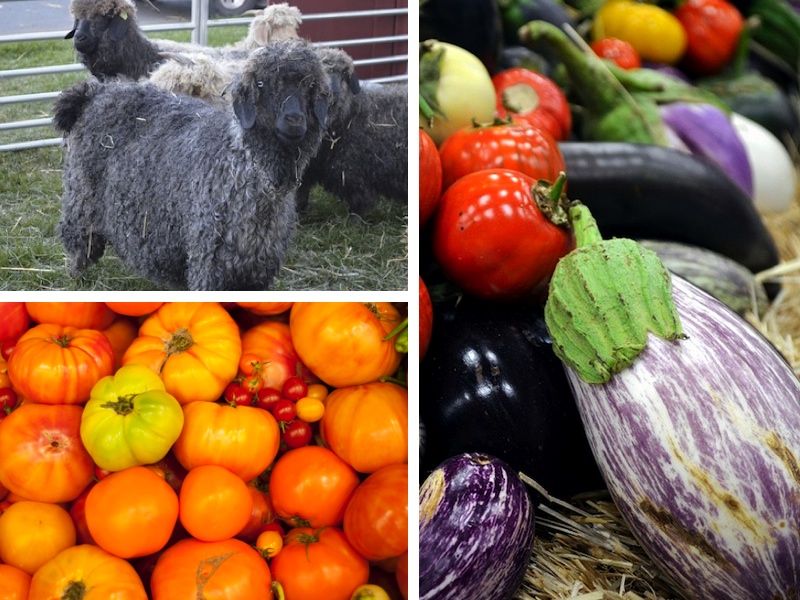
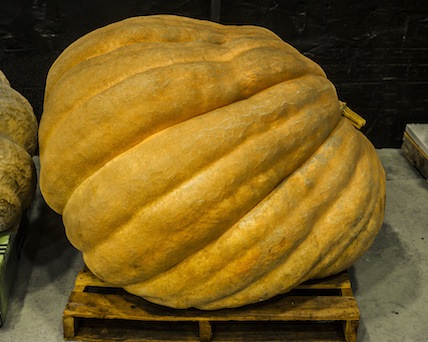
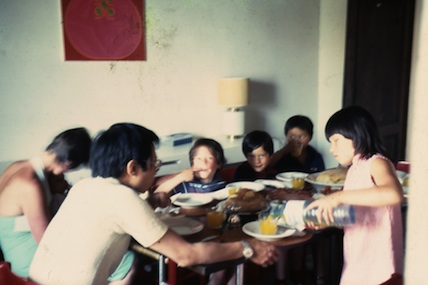

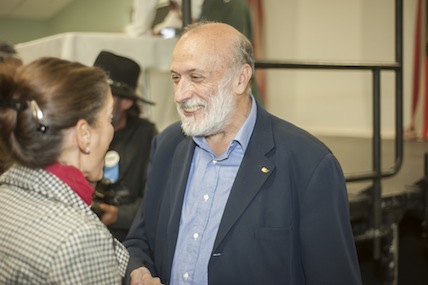

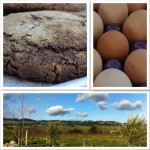


I love your post. I am also a recent transplant to Sonoma Co. and find my self giggling with joy that I too could visit the Heirloom Festival and return the same evening to hear Carlo Petrini speak. I too was overjoyed too listen to him speak in his native tongue. Today we will be making minestrone from our CSA allotment. Thank you.
Thank you for the feedback! Wasn’t Carlo wonderful?! Enjoy your minestrone.